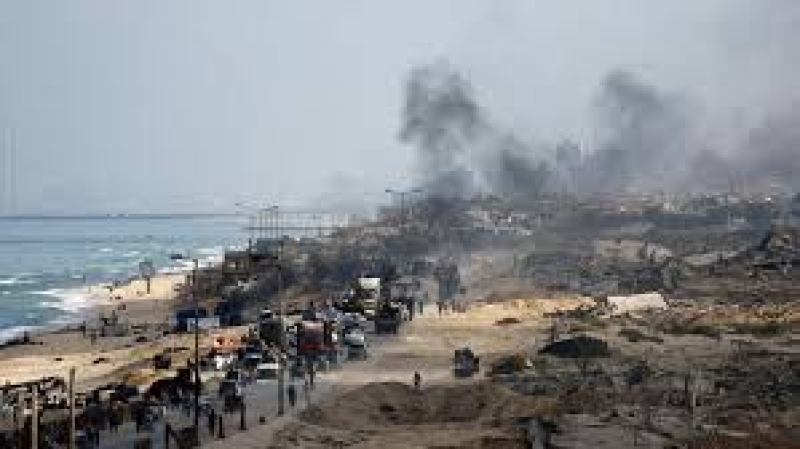- Dembele crowned king: PSG star wins Ballon d’Or |
- A Genocide Position Paper on the Plight of Palestine |
- Economy must move beyond narrow wealth accumulation: Yunus |
- Guterres Urges Recommitment to Two-State Israel-Palestine Solution |
- WHO Warns of Global NCD Crisis, Calls for Urgent Investment |
Gazans See no Respite as War Rages Despite State Recognition

Displaced Palestinians, fleeing northern Gaza due to an Israeli military operation, move southward along a destroyed area after Israeli forces ordered residents of Gaza City to evacuate to the south, in the central Gaza Strip, September 23. Photo collected
For the people of Gaza, global recognition of a Palestinian state has brought little relief. As world leaders announced what many described as a historic diplomatic breakthrough, Israeli forces pressed deeper into Gaza City, intensifying an already devastating war that has displaced millions and reduced much of the territory to rubble.
On Tuesday, Israeli tanks advanced towards the most densely populated western neighbourhoods of Gaza City, including Sabra and Tel Al-Hawa. Residents reported massive detonations as Israeli forces blew up explosive-laden vehicles, destroying homes and roads in the process. Local authorities said at least 22 Palestinians were killed in the day’s assault, with 18 of them in Gaza City alone.
The humanitarian situation is deteriorating rapidly. Gaza’s health ministry has warned that hospitals will run out of fuel within days, leaving thousands of wounded and critically ill patients at risk. Already, three hospitals have ceased operations this week as Israeli troops pushed closer to urban areas.
For civilians trapped inside the enclave, recognition of Palestine by countries such as France, Canada, Australia, and the UK is seen as symbolic but disconnected from the daily horrors they face. “The children tremble all the time from the sounds of explosions. They are wiping out a city that is thousands of years old while the world is celebrating symbolic recognition,” said Huda, a mother of two from Gaza City.
Abu Mustafa, another resident, questioned the timing of international recognition: “Are we now being killed as the citizens of the state of Palestine? Those countries forgot that Gaza is being wiped out. We want the war to end, not declarations.”
The war, now approaching its second anniversary, was triggered by the Hamas-led attack on Israel on 7 October 2023 that killed about 1,200 people. Israel’s military response has been relentless, with Gaza’s health authorities claiming that more than 65,000 Palestinians have been killed since the conflict began. Despite mounting international criticism, Israeli Prime Minister Benjamin Netanyahu insists the offensive will continue until Hamas is completely eliminated.
Yet, no clear post-war plan for Gaza has been announced. Entire neighbourhoods lie in ruins, and more than half the population has been forced to flee their homes. In northern Gaza, families like that of 36-year-old Mohammed Al-Bayari are struggling to survive. “Every 10 to 15 minutes I need to rest for half an hour as I pull our belongings uphill with my children,” he said, describing a 14-hour journey in search of safety.
Meanwhile, global diplomacy has gathered pace. US President Donald Trump is scheduled to meet leaders from Saudi Arabia, the UAE, Qatar, Egypt, Jordan, Turkey, Indonesia, and Pakistan to discuss the crisis and post-war governance. Washington is seeking Arab and Muslim nations’ involvement in sending forces to Gaza to facilitate Israel’s eventual withdrawal and in providing funding for reconstruction.
However, Trump’s previous proposal in February—suggesting a US-controlled Gaza and the permanent displacement of Palestinians—was widely condemned as an attempt at “ethnic cleansing” and rejected under international law. Rights groups and the UN have reiterated that forced displacement of populations is illegal.
As the world debates governance and recognition, Gazans remain trapped between the escalating military campaign and the worsening humanitarian disaster. With food shortages, collapsing medical services, and relentless bombardments, recognition of a Palestinian state has offered no respite.

